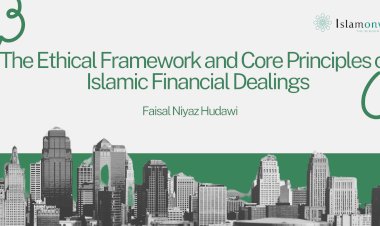An Overview of Financial Transactions in Islamic Fiqh: Key Characteristics
In Islamic jurisprudence, transactions are referred to as ‘aqd (plural: ‘uqūd), a term derived from the Arabic root meaning to bind, tie, or fasten, akin to securing a knot. This concept extends to agreements, covenants, and pledges, reflecting a binding commitment. The Qur’ān underscores the importance of honoring such obligations, stating, “O you who believe, fulfill your contracts (‘uqūd)” (Sūrat al-Mā’ida, 5:1). Here, ‘uqūd encapsulates all forms of binding agreements, whether financial, social, or spiritual, emphasizing their sanctity in Islamic law.
From a technical perspective, an ‘aqd is a legal obligation formalized through ījāb (offer) and qabūl (acceptance)[1], establishing a mutual bond between parties with defined rights and responsibilities. Transactions are broadly classified into financial (mālī) and non-financial (ghayr mālī) categories. Given the scope of this discussion, which focuses on financial dealings, non-financial contracts—such as marriage contracts (‘aqd al-nikāḥ)—are excluded, though they also fall under the broader umbrella of ‘uqūd.
‘Aqds can be unilateral, initiated by a single individual, or bilateral, involving two or more parties. Unilateral contracts include acts like making a vow (nadhr), taking an oath (yamīn), or waiving one’s right to owed wealth (ibrā’), often as a charitable gesture. These are self-imposed obligations that do not require mutual consent. In contrast, bilateral contracts, which are typically what is meant by “transactions” in this context, involve mutual agreement and include a wide array of financial dealings. Examples include sales (bay‘), leasing or service contracts (ijāra), and partnership-based arrangements such as mushāraka (joint venture, where partners share profits and losses) or muḍāraba (a profit-sharing partnership where one party provides capital and the other labor).
These bilateral transactions are governed by strict principles in Islamic law to ensure justice, transparency, and mutual benefit, as we discussed before. Financial transactions test one’s integrity and adherence to divine principles, ensuring that dealings are not only legally sound but also morally upright.
Binding (‘Aqd Lāzim) and Non-Binding (‘Aqd Jā’iz) Contracts in Islamic Jurisprudence
In Islamic law, once parties enter into a contract (‘aqd), its enforceability determines its classification as either ‘aqd lāzim (binding contract) or ‘aqd jā’iz (non-binding or revocable contract). A ‘aqd lāzim prohibits unilateral termination by either party unless specific conditions (shurūṭ) or valid reasons are met. This category includes critical financial transactions such as sales contracts (bay‘), leasing agreements (ijāra), Islamic forward sales known as salaam (where payment is made upfront for goods delivered later), and currency exchange (ṣarf)[2]. While certain sales contracts may permit withdrawal within a defined period—such as through the right of option (khiyār al-majlis or khiyār al-sharṭ), allowing cancellation during the session or under agreed conditions—unilateral termination is generally impermissible once the contract is finalized. Notably, a ‘aqd lāzim remains in force even if one party dies or becomes incapacitated (e.g., due to insanity or legal impediments); the contract’s rights and obligations are transferred to the party’s heirs or legal representatives, ensuring continuity and stability in financial dealings.
Conversely, a ‘aqd jā’iz permits either party to terminate the agreement unilaterally without requiring the other’s consent. This category includes agency contracts (wakāla), partnership arrangements like mushāraka (joint venture where partners share profits and losses) and muḍāraba (profit-sharing partnership where one provides capital and the other labor), loans (qarḍ), and deposits (wadi‘a). However, the right to withdraw is not absolute; the principle of “no harm or harming” (lā ḍarar wa lā ḍirār), as established in a well-known hadith, prohibits termination if it would cause detriment to the other party[3]. For instance, if an agent (wakīl) in a wakāla contract withdraws abruptly, causing financial loss to the principal, such an action would be invalid. Additionally, ‘aqd jā’iz contracts automatically dissolve if one party dies or loses legal capacity to transact, such as through bankruptcy or mental incapacity, reflecting their non-binding nature.
A third category exists where the contract is binding on only one party while remaining revocable for the other. Examples include pawning (rahn), where the creditor is bound to return the pawned item upon repayment but the debtor may reclaim it; personal guarantees (kafāla), where the guarantor is obligated but the principal debtor may withdraw; and financial guarantees (ḍamān), where the guarantor assumes liability unilaterally. These contracts balance flexibility with obligation, ensuring fairness in specific contexts.
Compensatory (‘Aqd Mu‘āwaḍa) and Gratuitous (‘Aqd Irfāq) Contracts
Islamic jurisprudence classifies contracts (‘aqd) into two categories based on their underlying objectives: compensatory and gratuitous. A ‘aqd mu‘āwaḍa (compensatory contract, literally “exchange for exchange”) involves transactions where both parties seek mutual financial benefit. This category encompasses essential economic activities such as sales (bay‘), partnership arrangements like mushāraka (joint venture with shared profits and losses) and muḍāraba (profit-sharing partnership where one provides capital and the other labor), and leasing agreements (ijāra). These contracts are structured around the principle of mutual exchange, where each party provides something of value (e.g., goods, services, or capital) in return for a corresponding benefit, ensuring fairness and equivalence as mandated by Islamic law.
In contrast, a ‘aqd irfāq (also termed ‘aqd iḥsān or ‘aqd tabarru‘, meaning gratuitous or charitable contracts) prioritizes assisting another party without the intention of profit or material gain. Examples include lending money or goods (qarḍ), entrusting deposits (wadi‘a), pawning (rahn), and providing guarantees, whether personal (kafāla) or financial (ḍamān). Unlike ‘aqd mu‘āwaḍa, which focuses on equitable exchange, ‘aqd irfāq is rooted in altruism and social welfare, reflecting the Islamic ethic of mutual support. Consequently, Islamic law often grants leniency in certain rulings for these contracts, such as relaxing strict conditions to facilitate acts of charity and assistance.
However, Islam strictly prohibits charging a fee or seeking profit in exchange for the assistance provided in ‘aqd irfāq. Seeking profit in such transactions risks exploitation, particularly in situations of need, which contradicts the spirit of iḥsān (benevolence) that these contracts embody. For example, if a lender (muqriḍ) in a qarḍ contract stipulates that the borrower (muqtariḍ) must repay more than the principal—such as through interest or additional fees—the transaction is rendered invalid and falls under the category of usury (ribā), a grave sin in Islam. The Qur’ān explicitly condemns ribā, stating, “But Allah has permitted trade and forbidden usury” (Sūrat al-Baqara, 2:275). On this matter, there is unanimous consensus (ijmā‘) among Islamic scholars[4], underscoring the severity of violating this principle.
This distinction between ‘aqd mu‘āwaḍa and ‘aqd irfāq reinforces the ethical framework of Islamic finance, where wealth is a trust from Allah. While mu‘āwaḍa contracts ensure economic justice through mutual benefit, irfāq contracts promote social justice by fostering compassion and solidarity, ensuring that financial dealings do not devolve into exploitation.
Contracts of Ownership (‘Aqd Tamlīk), Documentation (‘Aqd Tawthīq), Authorization (‘Aqd Ithlāq), and Other Classifications in Islamic Jurisprudence
Islamic law further classifies contracts (‘aqd) based on the legal obligations they create, reflecting the diverse nature of financial and social interactions. A ‘aqd tamlīk (contract of ownership) involves the transfer of ownership (milk) of a tangible property or intangible benefit to another party. This category encompasses fundamental economic transactions such as sales (bay‘), where ownership of goods is exchanged for payment; leasing or service contracts (ijāra), where the right to use a property or benefit from a service is transferred temporarily; and voluntary donations (tabarru‘), such as gifts (hiba) or charitable endowments (waqf), which involve transferring ownership without expecting compensation.
In contrast, a ‘aqd tawthīq (contract of documentation) is designed to secure or affirm the rights of a party, often serving as a legal safeguard. Examples include pawning (rahn), where a debtor provides an asset as collateral to secure a loan; and guarantees, whether personal (kafāla), where an individual assumes responsibility for another’s obligation, or financial (ḍamān), where a party guarantees payment or performance.
A ‘aqd ithlāq (contract of authorization) grants permission to manage wealth or rights that one does not independently own or control. This includes agency contracts (wakāla), where an agent (wakīl) is authorized to act on behalf of a principal (muwakkil), and īṣā’, where one permits another to utilize their wealth for a specific purpose, such as investing or managing funds. These contracts reflect a delegation of authority, often falling under the ‘aqd jā’iz (revocable contracts) category as they can typically be terminated unilaterally unless harm (ḍarar) would result.
Transactions aimed at sharing wealth, business, or profits are classified as ‘aqd ishtirāk (partnership contracts). Islamic jurisprudence details various forms of partnerships, such as mushāraka (joint venture with shared profits and losses) and muḍāraba (profit-sharing partnership where one party provides capital and the other labor). These contracts are elaborated in dedicated chapters of fiqh texts, addressing their conditions, profit distribution, and risk-sharing mechanisms to ensure fairness and compliance with Sharia principles.
Finally, a distinct category includes contracts like wadi‘a (deposit contracts), where one entrusts their wealth to another for safekeeping. These contracts, often considered ‘aqd irfāq (gratuitous), impose a fiduciary duty on the custodian (musta wda‘) to protect the deposited property without seeking profit, aligning with the Islamic ethic of mutual support. The Qur’ān emphasizes the importance of fulfilling such trusts, stating, “Indeed, Allah commands you to render trusts to whom they are due” (Sūrat al-Nisā’, 4:58), a principle that underpins all these contract types.
Essential Components of a Transaction in Islamic Jurisprudence
In Islamic law, a valid transaction (‘aqd) hinges on three fundamental components, often referred to as the arkān (pillars) of a contract: the contracting party (‘āqid), the subject matter of the transaction (maḥall al-‘aqd or ma‘qūd ‘alayhi), and the formal wording or expression of the contract (ṣīgha). These elements ensure the legality and enforceability of the ‘aqd, aligning with the Qur’ānic command to fulfill contracts (Sūrat al-Mā’ida, 5:1). While the specific conditions (shurūṭ) and elaborations of these components may differ across various types of contracts, their general principles are outlined here.
The Contracting Party (‘Āqid)
In Islamic jurisprudence, the contracting party (‘āqid)—the individual entering into a transaction (‘aqd)—must meet specific criteria to ensure the contract’s validity. The primary requirements for an ‘āqid are legal capacity (ahliyya) and voluntary consent (ikhtiyār)
Legal Capacity
The ‘āqid must be of legal age (bāligh, having reached puberty) and possess sound intellect (‘āqil). Individuals with mental incapacity (maj nūn, insane) lack the ability to comprehend the implications of a contract, rendering their transactions invalid (bāṭil). This ensures that parties are fully accountable for their obligations, a principle rooted in the Islamic view of responsibility.
However, the validity of transactions by discerning minors (mumayyiz, children capable of distinguishing right from wrong) is debated among scholars. The Mālikī, Ḥanbalī, and Ḥanafī schools[5] generally hold that:
- Transactions bringing complete benefit to the minor—such as accepting charity (ṣadaqa) or a gift (hiba)—are valid, as they align with the child’s welfare.
- Transactions resulting in complete loss, such as selling valuable property for a trivial price, are invalid (bāṭil), as they harm the minor’s interests.
- Other transactions (e.g., buying or selling with potential benefit and risk) may be valid if conducted with the guardian’s (walī) permission, reflecting the guardian’s role in protecting the minor’s interests.
In contrast, the Shāfi‘ī school adopts a stricter stance[6], asserting that transactions by minors are invalid under all circumstances, emphasizing the necessity of full legal capacity for contractual obligations. This scholarly divergence highlights the balance between protecting vulnerable parties and allowing limited agency for minors in beneficial contexts.
Voluntary Consent
The ‘āqid must enter the transaction of their own free will (ikhtiyār). Contracts formed under coercion (ikrāh), such as through threats or force, are invalid, as they violate the foundational principle of mutual satisfaction (riḍā). The Qur’ān explicitly states, “O you who believe, do not consume one another’s wealth unjustly, except through trade by mutual consent (tarāḍin)…” (Sūrat al-Nisā’, 4:29). This verse underscores that consent is the bedrock of lawful transactions, ensuring that neither party exploits the other.
Imam al-Ghazālī further reinforces this principle, equating the acquisition of wealth through defamation to seizing it through power and authority[7]. Both methods undermine the ethical integrity of a transaction by negating genuine consent, leading to injustice (ẓulm). A significant group of scholars (jum hūr al-‘ulamā’) also opine that transactions involving deception (ghishsh) or exploitation of ignorance (jah l), which cause substantial loss to one party, are deemed to lack mutual satisfaction[8]. For example, if a seller conceals a defect in a product to mislead an unaware buyer, the transaction violates riḍā and may be subject to annulment (faskh).
This emphasis on capacity and consent ensures that transactions reflect fairness and ethical responsibility, preventing exploitation and upholding the Islamic view of wealth as a trust (Sūrat al-Nisā’, 4:5). It also connects to the broader principle of accountability.
The Subject Matter of the Transaction (Maḥall al-‘Aqd or Ma‘qūd ‘Alayhi)
In Islamic jurisprudence, the subject matter of a transaction, termed maḥall al-‘aqd or ma‘qūd ‘alayhi, is a critical component (rukn) of a valid contract (‘aqd). The maḥall can encompass a tangible object (‘ayn), its benefit (manfa‘a), a right (ḥaqq), or a service/work (‘amal), varying based on the transaction’s nature—whether it be a sale (bay‘), lease (ijāra), or service contract. While specific conditions (shurūṭ) may differ depending on the transaction type, the general principles[9] ensuring the maḥall’s validity are outlined here, reflecting the Islamic emphasis on justice (‘adl) and transparency in financial dealings.
- Ownership (Milk)
The subject matter must be owned by the party transacting on behalf of the other (‘āqid). For instance, selling an item that one does not own is impermissible (ḥarām), as it violates the principle of ownership (milk). The Qur’ān reinforces this by prohibiting the unjust consumption of others’ wealth (Sūrat al-Nisā’, 4:29). However, an exception exists in salaam (Islamic forward sale), where goods are delivered in the future. In a salaam contract, the seller does not own the goods at the time of the contract but agrees to deliver them later, subject to strict conditions: the goods must be precisely defined (ma‘lūm), the price paid upfront, and delivery guaranteed at a specified time.
- Lawfulness (Mubāḥ)
The maḥall must be Islamically beneficial (manfa‘a mubāḥa) and permissible (ḥalāl). Transactions involving prohibited items or benefits—such as pork, usury (ribā), or products causing societal harm (mafsada), like drugs or gambling tools—are invalid. This extends to services or leasing (ijāra) for such purposes, such as renting a space for illicit activities. Scholars assert that items lacking benefit (manfa‘a) or causing harm (ḍarar) do not qualify as wealth (māl) in Islamic law[10]. For example, the Prophet (peace be upon him) prohibited the sale of alcohol (khamr), as narrated in Sahih al-Bukhari. This condition ensures that transactions align with the Islamic objective of promoting welfare (maṣlaḥa) and avoiding harm.
- Clearly Known (ma‘lūm) and Absence of Uncertainty (Gharar)
The subject matter must be clearly known (ma‘lūm) to both parties to prevent disputes later. If the maḥall is a specific item (‘ayn), it must be physically seen or inspected; if not, its quality and quantity must be precisely described. For instance, in a bay‘ contract, selling “a bag of rice” without specifying its type, weight, or quality introduces uncertainty (gharar), which Islam prohibits. This clarity eliminates deception (ghishsh), significant loss (khasāra), and unnecessary risk (mukha ṭara), ensuring transparency.
- Deliverability (Maqdūr ‘Alayhi)
The maḥall must be deliverable (maqdūr ‘alayhi) by the transacting party. Even if an item is legally owned, if it is encumbered—such as being pawned (rahn) or under another’s control (taḥt al-yad al-ghayr)—it cannot be used in a transaction until the encumbrance is lifted. For example, if a car is owned but currently pawned to secure a debt, the owner cannot sell it until the debt is cleared and the car is released.
Reference:
[1] Al-Manthūr fī al-Qawā‘id al-Fiqhiyya, Sarkashī, 2:397
[2] Al-Ashbāh wa al-Naẓā’ir, al-Suyūṭī, 275
[3] Al-Manthūr fī al-Qawā‘id al-Fiqhiyya, Sarkashī, 2:408
[4] Al-Mawsū‘a al-Fiqhiyya al-Kuwaytiyya, 33:130
[5] Al-Mawsū‘a al-Fiqhiyya al-Kuwaytiyya, 30:219
[6] Rawḍat al-Ṭālibīn, al-Nawawī, 3:344
[7] Fatāwā al-Kubrā, 4:112
[8] Al-Mu‘āmalāt al-Māliyya Aṣwālatan wa Mu‘āṣiratan, Dib yān, 2:115
[9] Al-Mawsū‘a al-Fiqhiyya al-Kuwaytiyya, 30:221–226, Tuḥfat al-Muḥtāj, 4:241
[10] Rawḍat al-Ṭālibīn, al-Nawawī, 3:353
Disclaimer
The views expressed in this article are the author’s own and do not necessarily mirror Islamonweb’s editorial stance.
























Leave A Comment